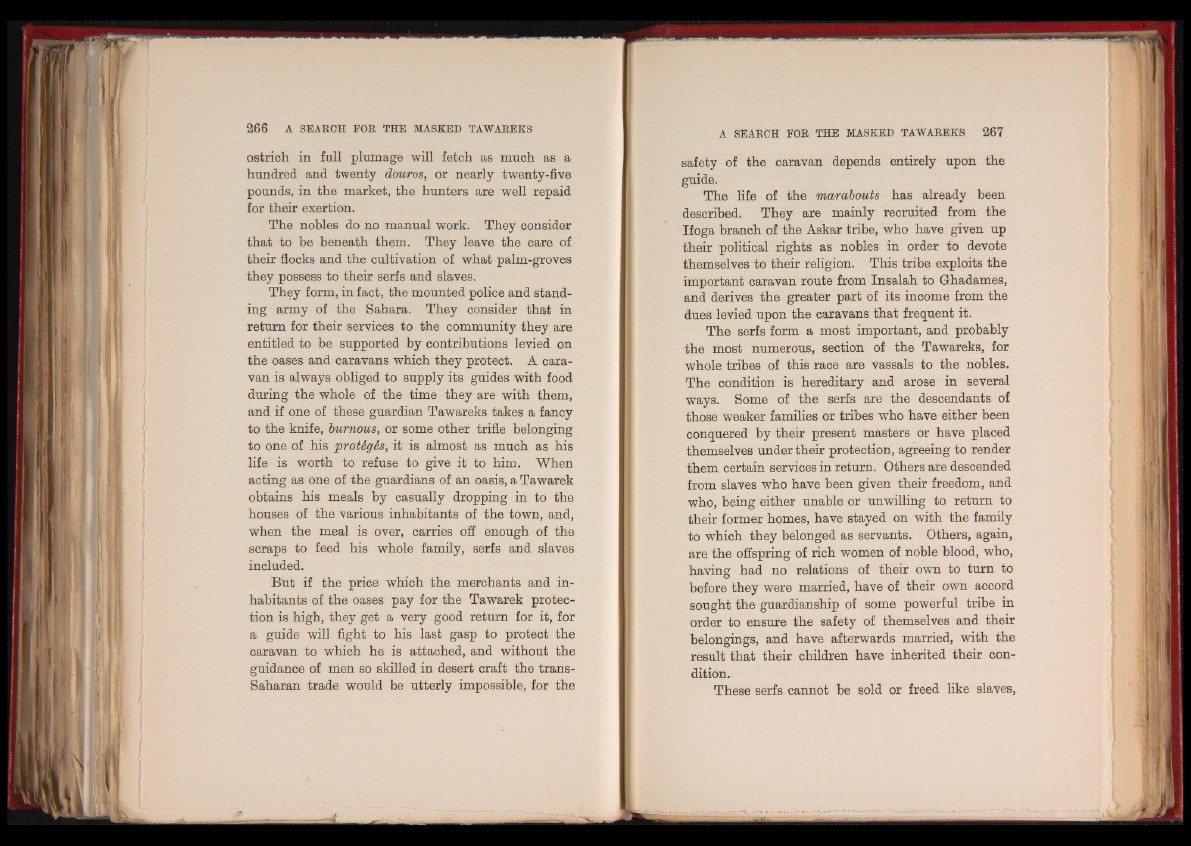
ostrich in full plumage will fetch as much as a
hundred and twenty douros, or nearly twenty-five
pounds, in the market, the hunters are well repaid
for their exertion.
The nobles do no manual work. They consider
that to be beneath them. They leave the care of
their flocks and the cultivation of what palm-groves
they possess to their serfs and slaves.
They form, in fact, the mounted police and standing
army of the Sahara. They consider that in
return for their services to the community they are
entitled to be supported by contributions levied on
the oases and caravans which they protect. A caravan
is always obliged to supply its guides with food
during the whole of the time they are with them,
and if one of these guardian Tawareks takes a fancy
to the knife, burnous, or some other trifle belonging
to one of his protégés, it is almost as much as his
life is worth to refuse to give it to him. When
acting as one of the guardians of an oasis, a Tawarek
obtains his meals by casually dropping in to the
houses of the various inhabitants of the town, and,
when the meal is over, carries off enough of the
scraps to feed his whole family, serfs and slaves
included.
But if the price which the merchants and inhabitants
of the oases pay for the Tawarek protection
is high, they get a very good return for it, for
a guide will fight to his last gasp to protect the
caravan to which he is attached, and without the
guidance of men so skilled in desert craft the trans-
Saharan trade would be utterly impossible, for the
safety of the caravan depends entirely upon the
guide.
The life of the marabouts has already been
described. They are mainly recruited from the
Ifoga branch of the Askar tribe, who have given up
their political rights as nobles in order to devote
themselves to their religion. This tribe exploits the
important caravan route from Insalah to Ghadames,
and derives the greater part of its income from the
dues levied upon the caravans that frequent it.
The serfs form a most important, and probably
the most numerous, section of the Tawareks, for
whole tribes of this race are vassals to the nobles.
The condition is hereditary and arose in several
ways. Some of the serfs are the descendants of
those weaker families or tribes who have either been
conquered by their present masters or have placed
themselves under their protection, agreeing to render
them certain services in return. Others are descended
from slaves who have been given their freedom, and
who, being either unable or unwilling to return to
their former homes, have stayed on with the family
to which they belonged as servants. Others, again,
are the offspring of rich women of noble blood, who,
having had no relations of their own to turn to
before they were married, have of their own accord
sought the guardianship of some powerful tribe in
order to ensure the safety of themselves and their
belongings, and have afterwards married, with the
result that their children have inherited their condition.
These serfs cannot be sold or freed like slaves,